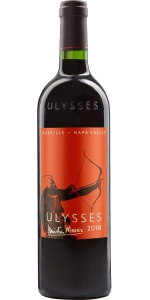Wine from Ulysses
Along the Napa Valley’s Oakville bench and extending over an alluvial fan at the foot of the Mayacamas Range, the site is exceptional for grape growing.
The soil is composed of deep, gravelly, clay loam and is particularly well-suited to growing Cabernet Sauvignon.
Since the acquisition, Christian Moueix and his team have pursued an in-depth understanding of the soil and microclimate and have undertaken a lengthy and meticulous vineyard restoration.
Dry farming, the foundation of Ulysses’ sustainable farming practices, enhances root depth and resistance to drought, resulting in a wine that is a pure expression of its terroir.
ULYSSES IS A RESULT
OF CHRISTIAN MOUEIX’S
ONGOING QUEST
to explore the unique character and quality of an exceptional terroir and to translate its specificity in a wine. His is a journey that began in Bordeaux and continues today in the Napa Valley.
Son of the famed Bordeaux wine merchant Jean-Pierre Moueix, Christian was born in Libourne, France. Having studied viticulture at University of California, Davis, his career has been notable by his introducing numerous vineyard practices, once considered revolutionary and now widely employed by most top chateaux. Today, along with Dominus Estate and Ulysses Vineyard in Napa Valley, he and his son, Edouard, produce wine from eight family chateaux in Pomerol and Saint Emilion.
Christian is driven by his zealous pursuit of perfection and his belief in stewardship. His 45-year career has earned him recognition as one of wine’s great visionaries. With deep interests in history, art and literature, Christian interprets the classic tale of Ulysses’ voyage as an epic journey and a lesson in humility. The story evokes commitment, passion and the passage of time, all elements essential to our understanding of a vineyard and its potential to produce great wines.
The 2019 Ulysses Cabernet Sauvignon has notes of truffle, blackberries, cassis bud and tobacco with tight polished tannins. A vertical structure and persistent intensity.
Review:
The 2019 Cabernet Sauvignon is mostly Cabernet Sauvignon (90%) with the rest Cabernet Franc and Petit Verdot. Incredible aromatics of red and black currants, spring flowers, graphite, camphor, and cedar define the aromatics, and it's incredibly polished and elegant on the palate, with medium to full body, gorgeous tannins, and a great finish. This is another awesome 2019 that matches ample richness and depth with a terrific sense of finesse.
-Jeb Dunnuck 97 Points
- back
Selected Options
Wineries
Categories
Pricing
Countries
Regions
Grape Types
Wineries
Organic/Free Shipping
Dr. Loosen Wehlener Sonnenuhr Alte Reben Riesling Grosses Gewachs is made from 100 percent Riesling.
This is one of the greatest vineyards in the Middle Mosel. This precipitously steep, rocky vineyard consistently yields some of the most elegant and sophisticated white wines in the world. Citrus and white peach flavors predominate when the wines are young, turning to a pure expression of the mineral soil as they age.
-James Suckling 94-95 Points
Clos du Val Estate Cabernet Sauvignon is made from 76% Cabernet Sauvignon, 7% Merlot, 5% Malbec and 1% each Cabernet Franc and Petit Verdot.
This fresh and vibrant Napa Valley Cabernet Sauvignon is brimming with aromas of blackberry, mulberry, cassis, and violet. On the palate, bright flavors of cranberry, red plum, cherry, and lavender are intertwined with supple tannins, balanced acidity, and a long, smooth finish.
Review:
"Sleek tannins, guided by sweet earth, slate, purple plum and black olive. Savory notes of fig, toasted cedar, and black tea meld with blackberries. Well structured and impeccably balanced."
-Tasting Panel 96 Points





